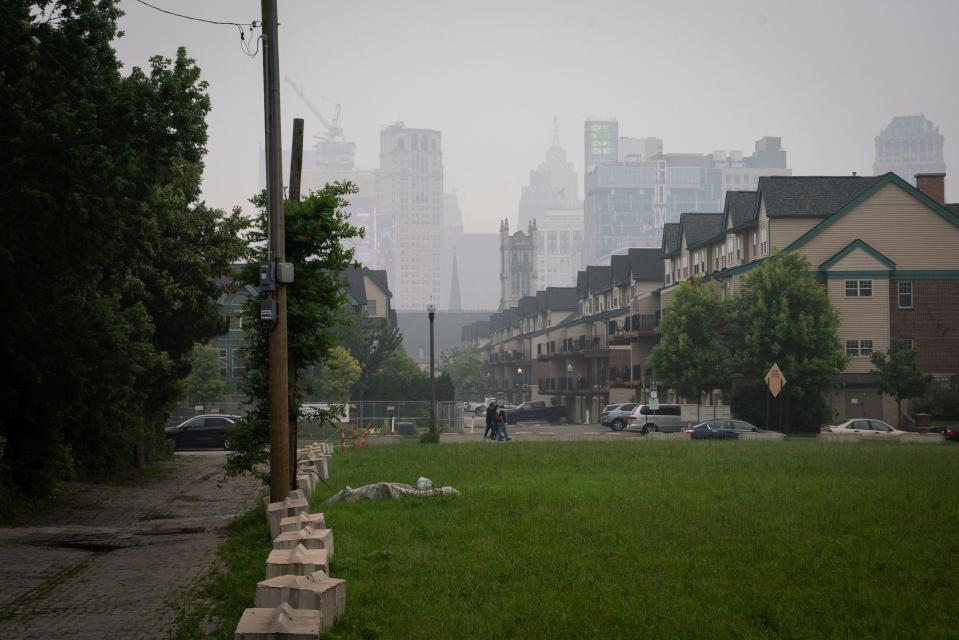Michigan’s bad air quality: Everything you need to know
Smoke from Canadian wildfires have brought smoky, hazy skies to Michigan at times in 2023, causing air quality alerts and ozone "action days" to be enacted.
But what is an air quality alert? How is air quality measured? What's considered "unhealthy" air quality, especially for sensitive groups? We have the answers to these questions and more.
Here's what you need to know to stay safe.
How is air quality measured?
The Air Quality Index (AQI) detects pollutants in the air using a scale from zero to 500, with 500 being the highest amount of pollutants. Air quality monitors have sensors, which detect certain pollutants in the air. The greater the density of pollutants in the air, the higher the AQI will be.
What air quality is considered unhealthy?
Here is the Air Quality Index scale:
0-50: Good (green)
51-100: Moderate (yellow)
101-150: Unhealthy for Sensitive Groups (orange)
151-200: Unhealthy (red)
201-300: Very Unhealthy (purple)
301+: Hazardous (dark red)
What causes bad air quality?
Bad air quality can be caused by a number of different things, including wildfire soot and smoke, and chemicals released when burning fossil fuels. When these emissions react with sunlight, an air pollution called "smog" or "ground ozone" is formed. This is common in big cities.
In Michigan, the primary culprit is the PM2.5 pollutant, a fine particulate matter that causes the sky to look hazy and reduces visibility, coming from wildfires in Canada.
Additionally, the Natural Resources Defense Council (NDRC) warns that the "production of allergenic air pollutants" like mold can also be increased by damp conditions due to flooding and affect air quality.

What are symptoms of bad air quality?
Symptoms depend on the type of air pollution, duration of exposure, severity, and individual health risks.
Wheezing, coughing, shortness of breath, and exacerbated illnesses (such as asthma) are all common symptoms.
Smog can irritate your eyes and damage your lungs.
Soot from fires can be especially harmful because particles are able to penetrate the lungs and bloodstream, potentially leading to heart attacks and death.
How to check air quality in your area
AirNow is a website operated by United States Environmental Protection Agency (EPA), and is a good source to check air quality index in your area. Search AirNow and the screen will allow you to enter your zip code, city, or state.
For example, here is the AirNow page for Detroit.
How to protect yourself from bad air quality
A few tips to stay safe when air quality is poor in your area:
Limit your time outdoors.
Make use of fans, filtered air conditioners and air purifiers when you're indoors.
Take care of outdoor errands and activities in the morning, as ozone levels tend to increase throughout the day.
Avoid highly trafficked and congested areas when you are outside.
Indoor plants like dracaena, peace lilies, and common ivy are thought to be good at helping to clean indoor air.
Check the Center for Disease Control (CDC) website for more information.
How to protect your pets from bad air quality
In areas of poor air quality, health officials recommend that pets spend limited amounts of time outside. They should stay inside as much as possible, with closed windows and doors.
If you want to take your animals out, parks and places with more trees and plants will tend to have better air quality.
What can you do to help air quality?
Anything that reduces the amount of air pollution you create can be helpful. This includes:
Reducing your electricity use
Turning off lights
Adjusting your thermostat
Driving less
Additionally, avoid burning firewood and trash, and using gas-powered lawn equipment.
This article originally appeared on Detroit Free Press: Air quality in Michigan: What you need to know

